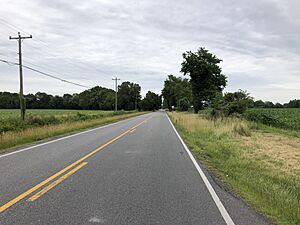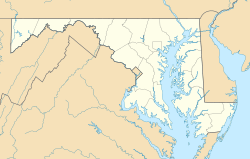Unionville, Talbot County, Maryland facts for kids
Quick facts for kids
Unionville, Maryland
|
|
|---|---|

View from Maryland State Route 370 outside of Unionville, MD
|
|
| Country | United States |
| State | Maryland |
| County | Talbot |
| Elevation | 13 ft (4 m) |
| Time zone | UTC-5 (Eastern (EST)) |
| • Summer (DST) | UTC-4 (EDT) |
| Area code(s) | 410 & 443 |
| GNIS feature ID | 591456 |
Unionville is a small, special community in Talbot County, Maryland, United States. It's called an "unincorporated community," which means it's a group of homes and businesses that isn't officially a town or city with its own local government. Unionville is located about 4.5 miles (7.2 km) northwest of Easton.
Contents
Discovering Unionville: A Special Community
Unionville might be the only village in the United States started by soldiers who were once enslaved. A special historical marker in Unionville tells its story. It says that Unionville is a historic African-American community. It was settled by people who used to be enslaved and by free Black people. Many of them fought in the Union Army during the Civil War. The village's name, Unionville, honors these local soldiers.
How Unionville Began
After the Civil War, Unionville grew quite a lot. It eventually had almost 40 buildings, including a church and a school. In the community's cemetery, there are graves of 18 Black soldiers. These brave men fought for the Union between 1863 and 1866.
A Tribute to Freedom Fighters
The creation of Unionville is largely thanks to Ezekiel Cowgill and his son, James M. Cowgill. They were Quakers, a religious group known for their peaceful beliefs and for supporting equality. The Cowgills owned a nearby property called Lombardy Plantation. In 1856, they set aside a piece of land specifically for these veterans.
Another of Ezekiel's sons, John Cowgill, was also a Quaker. Surprisingly, he served as a Captain in the Union Army during the Civil War. He was part of Company A, 108th Regiment U.S. Colored Infantry. It's not fully known why a Quaker, who typically avoids war, chose to fight.
The Cowgill Family's Role
The Cowgill family offered each of the eighteen veterans a plot of land. The cost was very low: just one dollar a year for thirty years. The land records show that the Cowgills wanted to do more than just give land for families. They wanted to help build a whole town.
Their agreements stated that the land was offered to free African-Americans. A key condition was that they would build a church and a school house in their new community. The first agreements, starting in 1867, sometimes called the land "Lombardy" or "Cowgillstown." But from 1870 onwards, the agreements officially named it "The Village of Unionville."
Today, the village is known as Unionville. This name honors the Union Army, which African-Americans believed helped them gain their freedom. The name "Cowgillstown" also serves as a tribute to Ezekiel, John, and James M. Cowgill. They strongly supported justice, freedom, dignity, and better living conditions for African-Americans during and after the Civil War and Emancipation.
 | James Van Der Zee |
 | Alma Thomas |
 | Ellis Wilson |
 | Margaret Taylor-Burroughs |


